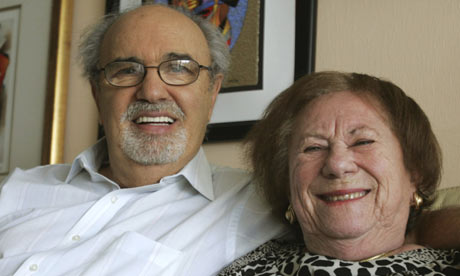
The disputed Holocaust memoir, written by Herman Rosenblat, which was dropped from Penguin Group's publication schedule at the end of December is now set to appear as a work of fiction.
Rosenblat's memoir - which Oprah Winfrey called "the single greatest love story" she had heard in two decades in television - recounted how as a teenage boy in a Nazi concentration camp, he was kept alive by the food which was thrown to him by a young girl, Roma Radzicky. Penguin's US imprint Berkley Books had planned to publish the story, which sees Rosenblat reunited with Radzicky on a blind date years later, as Angel at the Fence: the True Story of a Love That Survived, next month.
But a Holocaust historian said it would have been impossible to approach the fence in the Schlieben concentration camp to throw food over it, concluding that this part of the story was made-up. Berkley initially defended the book, saying it was a work of memory, but then decided to cancel its planned publication, and demanded the return of the advance it had made to Rosenblat. A $25m film based on the book, to be called The Flower of the Fence, is still going ahead, with production due to start this year.
Publisher York House Press based in White Plains, New York, has entered into a tentative agreement with the film production company to publish a novel based on the film script early this spring. It said the book would be "grounded in fact", and would rise "to the proper levels of artistic value, ethical conduct and social responsibility".
A spokesperson for York House Press condemned the attacks which were made on the 80-year-old Rosenblat after the veracity of his story was questioned, describing them as a "savage" response to what was otherwise "a credible, heart-wrenching, and verifiable account" of his time in the concentration camp.
"No deliberate untruth is permissible, but beneath any fabrication is motivation and intent. We believe Mr. Rosenblat's motivations were very human, understandable and forgivable," the spokesperson said. "It is beyond our expertise to know how Holocaust survivors cope with their trauma. Do they deny, try to forget, rationalise or fantasise and promote fiction along with truth? Perhaps the coping mechanisms are as individual as the survivors themselves."
The president of the company producing the film, Harris Salomon from Atlantic Overseas Productions, said the book, "regardless of its shortcomings", would "challenge, educate and enlighten" readers about the horrors of the Holocaust. "The documented fact, acknowledged by his critics, is that Herman is a survivor of concentration camps," he said.
But Rosenblat's agent, Andrea Hurst, said that neither she nor Rosenblat were involved with this version of his story. "Usually book rights from films come out after the movie is released," she told theguardian.com. "I think the timing on this is very insensitive."

